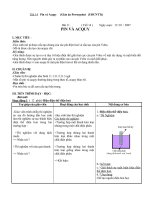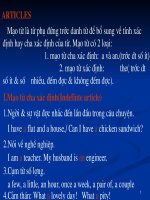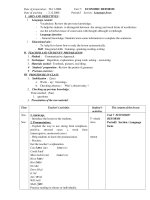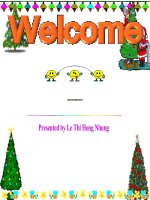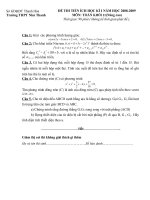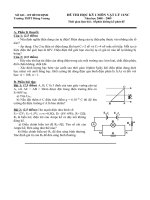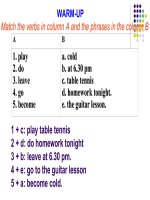11NC- unit2-Language focus
Bạn đang xem bản rút gọn của tài liệu. Xem và tải ngay bản đầy đủ của tài liệu tại đây (157.58 KB, 13 trang )
LESSON PLAN
Unit Two
Personal Experience
Lessons N
o
6 – 7 Language Focus
Outcomes - By the end of the lesson, the students are able to use verbs of the senses.
- By the end of the lesson, the students are able to use modal perfect to
talk about the past.
- By the end of the lesson, the students are able to use different verb forms
Type of lesson - Grammar-based (sense verbs, modal perfect, verb forms)
Key Vocabulary - sense verbs: see, hear, ... - wander
- chef - nostalgic
Key structures - You could have left it at home.
- It must have rained last night.
Anticipated
problems
- Some students may be too shy to express themselves.
Materials - Textbook - Handouts
- Chalk and board - Pieces of paper
Stage /
Timing
Procedure Aims Focus Materials
1.
Warm-
up
(7-9')
2. Word
study
Game: Lucky symbol
- Write the words eyes, ears, nose, tongue, hands / skin and
a lucky symbol (...) on small pieces of paper, fold them up
and put them in a hat.
- Tell SS to work in 3 groups.
- A representative from each group will take turns to pick up
a piece of paper, and read the word. The students from the
other groups will make 3 questions for this group. For one
suitable answer, the group scores 1 point. The lucky symbol
will earn the group 2 points. The group with more points will
win the game.
The questions used for each word are:
- What can you do with your ...(eyes) ...?
- Who can't do this? / Who can't.. .(see what you see) ?
- What animals are good at... (seeing) .....?
- When the game is over, elicit from SS the verbs used for
the senses.
Expected: see; smell; taste; touch; hear;
Transition: - Todav we will practise using sense verbs to
talk about the activities of the senses.
- Write down on the board: Unit 2 Language Focus
Sense Verbs
- Elicit from SS sentences with the sense verbs.
-To
arouse
interest
and to
introduce
the
language
point
- To lead
to the
lesson
Group
s
T-SS
T-
class
T-
class
- Pieces of
paper
- A
hat/box
- Chalk &
board
- Chalk &
board
(12-15') - Write down on the board three sentences and ask SS to
distinguish the verbs used.
a. I can smell something burning.
b. This flower smells good.
c. It smells like orange.
Expected:
- In sentence a, smell is a transitive verb, with something
as an object.
- In sentences b and c, smell is an intransitive verb
followed by an adjective or a prepositional phrase with
like.
- Tells SS that there are two groups of verbs: transitive
followed by an object, and intransitive or linking verbs.
- To help
SS
distinguish
the
different
structures
of the
verbs
- For SS
to
generalise
the form
and use of
the verbs
T-
class
T-
cIass
- Chalk &
board
- Textbook
- Chalk &
board
Senses Transitive verbs Intransitive / Linking verbs
sight
taste
smell
hearing
touch
see (thấy)
taste (nếm)
smell (ngửi) +
Obj
hear (nghe)
touch (sờ)
look
(trông có vẻ)
taste (có vị)
smell (có mùi)
+Adj./like+N
sound (nghe có vẻ)
feel (sờ thấy)
Notes: - These linking verbs and most of these transitive
verbs are not used in the present continuous.
T-class - Chalk &
Board
(5-7')
(5-7')
(7-9’)
Activity! Talking about the senses (Task a. v. 31)
- Tell .SS to work in pairs and make questions and
answers about the senses, based on the words given.
- Go around to monitor and note down error for correction
later.
- Call on some pairs (close and open pairs) to act out their
conversations.
- Give feedback and comments.
Activity 2 Answering the quiz (Task b, p.31)
- Ask SS to answer the questions in Task b and then with
a partner ask and answer the questions.
- Call on some pairs to act our their exchanges and go
over the answers with the class.
Activity 3 Transformation
- Give each student a handout of the transformation
exercise.
- Ask SS to read the sentences and rewrite them as
directed.
- Go over the answers with the class.
The handout:
Rewrite the sentences as shown, using sense verbs. The
first one has been done as an example.
0. I like the smell of this perfume. It's good.
This .... perfume smells good to me
1. I don't like the bitter taste of this coffee.
This ............................
2. Don't touch that water. It's still hot.
-To
practise
using the
sense
verbs
- More
practice
with sense
verbs
-To
provide
further
practice
with sense
verbs in
the written
form
Pairs
T-class
SS-SS
Pairs
T-class
Indivi-
duals
T-ciass
- Textbook
- Textbook
- Handouts
3. Gram-
Mar
(10-13')
That water................................, so don't touch it.
3. He thinks the music is terrible.
The...........................................
4. Joe had a happy expression.
Joe...........................................
5. This dish has a good smell but it tastes horrible.
-> This ...............
Expected answers:
1. This coffee tastes bitter to me.
2. That water still feels hot, so don't touch it.
3. The music sounds terrible to him.
4. Joe looked happy.
5. This dish smells good but it tastes horrible.
Modal Perfect: Modal + have + Past Participle
- Write some sentences on the board, using key
structures.
1. Jane didn't answer when I called last night. She might
have gone out.
2. Look! The ground is so wet. It must have rained last
night.
3. Ann came home very late last night. She could have
walked.
4. It's your fault. You should have told your parents about
the accident.
To
introduce
another
language
point
T-class - Textbook
- Chalk &
board
(8-10')
(9-10')
- Tell SS to pay attention to the second sentences, and
ask them questions.
a. Did Jane go out last night? (Expected: Maybe, but I'm
not sure.)
b. Did it rain last night? (Expected: I'm sure it did./It
probably rained.)
c. Did Ann walked home last night? (Expected: Very likely,
but I'm not sure.)
d. Was it necessary to tell your parents about it? Did you
do it?
(Expected: Yes, it was necessary to do it, but you didn't.)
- Elicit the tense, form, use and time these sentences
indicate.
Expected: + Tense: Modal Perfect
+ Form: Modal + have + Past Participle
+ Use: To indicate uncertainty /a past possibility
(could / may / might + perfective: có thể … đã …), to make
a deduction/logical conclusion in the past (must +
perfective: ắt hẳn, chắc là …), or to make a criticism, to
indicate an obligation that was supposed to occur in the
past (should + perfective: lẽ ra … nên …)
Activity 1 Transformation (Task, p.32)
- Ask SS to rewrite the sentences as shown to talk about
past possibilities.
- Tell SS to compare answers with a partner and then go
over the, answers
with the class.
Activity 2 True or False?
- Give out handouts with sentences and explanations.
- To elicit
and focus
SS'
attention
on
meaning &
use the
modal
perfect
-For SS
to practise
making
deductions
T-class
Indivi-
duals
Pairs
T-class
- Chalk &
board
- Textbook
- Tell SS to read the sentences and the explanations for
each and decide if the explanations are true or false
according to the information given.
- Ask SS to compare answers in small groups and then
- To check
SS" under-
standing of
meaning
Indivi-
duals
Groups
T-class
- Handouts
go over the answers with the class.
The handout:
Read the sentences and decide if the explanations are
True or False. Write T or F. The first one has been done
as an example.
0. Lucy could have taken the bus to work yesterday.
a. .. F.. Lucy took the bus to work yesterday.
b. .. T.. Perhaps Lucy took the bus to work yesterday.
1. You shouldn't have eaten so much.
a....... You didn't eat too much and that was necessary.
b....... You ate too much and that was not good.
2. The cause of the fire could have been a burning
cigarette.
a....... The fire was possibly caused by a burning
cigarette.
b....... The fire was caused by a burning cigarette.
3. John did very well on tie exam. He must have studied
hard
a....... John probably studied hard.
b....... I'm sure John studied hard.
4. Dave can't have been at the cinema. He was with me
last night.
a....... Dave was at the cinema last night.
b....... I'm sure Dave was not at the cinema last night.
5. Why is Tom so late? He might have lost his way.
a....... Tom is late because he has lost his way.
b....... Perhaps Tom has lost his way.
and use of
the
structure
- For SS to
share and
learn
(7-8')
4.
Home-
work
(1’)
Expected answers: 1. a. F, b. T 2. a. T. b. F
3. a. T, b. T 4. a. F, b. T 5. a. F, b. T
Verb Form Review (Tasks a & b. d.32 - 33)
- Elicit from SS the tense used to express a habitual
action. (Expected: present simple)
- Ask SS to complete the texts with the correct tense &
form of the verbs.
- Tell SS to compare answers with a partner and then go
over the answers.
Sentence Completion
Complete each sentence so that it contains the words
given in bold.
1. You're completely soaked! You .........
(should /umbrella)
2. I've lost my bag. I ...................(must / train)
3. Jim did badly in the test. He .... (should/harder)
4. Tom looks tired. He ..............(might / all night)
Expected answers:
1. You're completely soaked! You should have taken an
umbrella.
2. I've lost my bag. I must have left it on the train.
3. Jim did badly in the test. He should have studied
harder.
4. Tom looks tired. He might have worked / studied
/stayed up all night.
-To
review
different
tenses
used
- To give
SS more
practice at
home to
review
what they
have
earae
T-class
Indivi-
duals
Pairs
Indivi-
duals
- Textbook
- Handouts
or Chalk &
board
LESSON PLAN
Unit two:
Personal Experience
Lessons N
o
5 Writing
Outcomes - By the end of the lesson, the students are able to write a personal letter.
- By the end of the lesson, the students are able to describe a past
experience.
Type of lesson Skill-based (writing)
Key Vocabulary - commencement - mutual
- confused - host
Key structures - I felt extremely embarrassed and confused.
- Looking forward to hearing from you again.
Anticipated problems
- Some students may be too shy to express themselves even in writing.
Materials - Textbook - Handouts
- Chalk and board - Sheets of paper
Stage /
Timing
Procedure Aims Focus Materials
1.
Warm-
up &
lead-in
(4-5')
2. Pre-
writing
(4-5')
Game: Guess what?
- Show a picture of a person sitting in a restaurant with
a bowl of soup in front, and a waiter at his side.
- Ask SS to read the exchange between the man and
the waiter and guess what the man's response is /
what the reason is. (Appendix)
Expected answer: 'Because I haven't got a spoon!'
- Elicit experiences from SS: 'This is something
happening in a restaurant. Have you ever had any
embarrassing experiences in a restaurant?'
- Note down SS' ideas,
Transition: - Nam had an embarrassing experience at
a restaurant and he wrote to tell his friend about it. Do
you want to share your experience with your friend?
Today we will learn how to write a letter telling friends
about a past experience.
- Write down on the board: Unit 2 Writing a
Personal Letter Describing a Past Experience
Activity 1: Gap-filling (Task a, p.30)
- Ask SS to complete the letter using the words given. -
Move around to control and give help if necessary.
- Get SS to compare answers in pairs and then go over
the answers.
- To create
interest
and to
introduce
the topic
-To
familiarise
SS with a
letter
describing
a past
experience
- To help
Indivi-
duals
T-class
T-class
T-class
Indivi-
duals
Pairs
- Pictures
- Chalk &
board
- Chalk &
board
- Textbook
